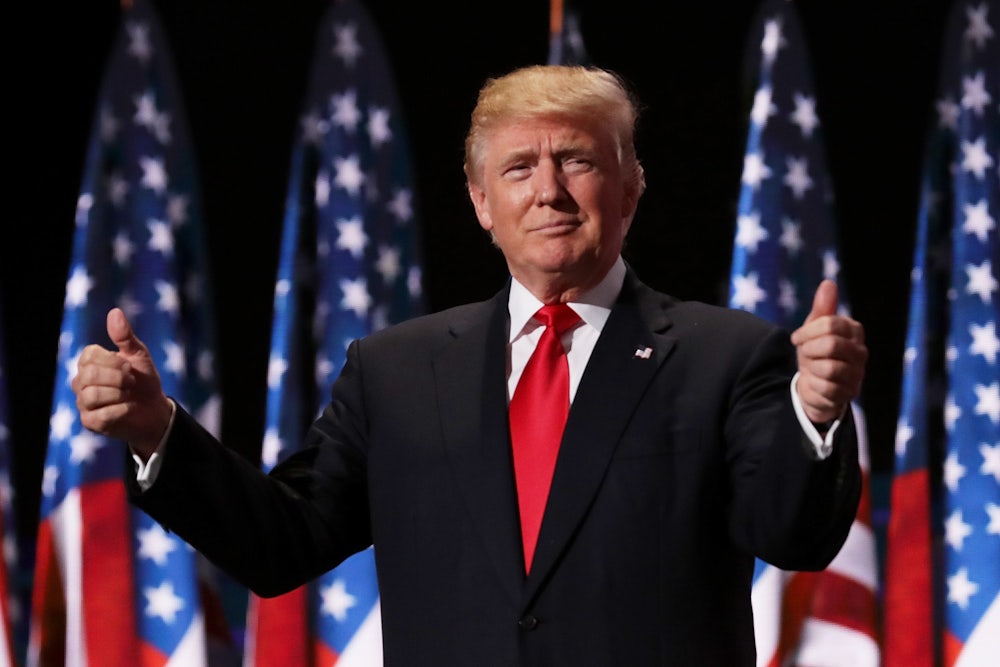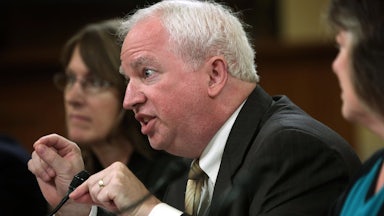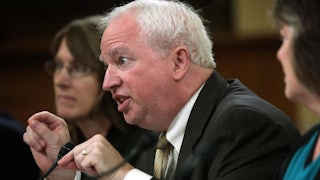The United States has now regained all the jobs it lost during the Covid-19 pandemic, but some major openings remain. On Tuesday, The Washington Post reported that former President Donald Trump is having some trouble hiring good lawyers to represent him. While Trump is no stranger to legal troubles, things are somewhat more urgent after the FBI searched his Mar-a-Lago resort for classified materials last week, an unprecedented step against a former president.
Trump denies that anything is wrong, of course. In a statement posted on Truth Social on Wednesday night, he angrily denounced reports about his lawyer-hiring woes as, well, untruthful. “The WAPO story that ‘Trump is scrambling to add seasoned lawyers’ to the Mar-a-Lago Raid case is, as usual, FAKE NEWS,” he claimed. “I already have excellent and experienced lawyers—[I] am very happy with them. This is highly political prosecutorial misconduct, I have not been charged with anything and, most importantly, I did nothing wrong. Thank you!”
On paper, it is strange that Trump would have trouble hiring lawyers. It would be hard to find a more prestigious client than a former president of the United States, especially one who regularly flaunts his wealth and resources. Perhaps the problem is that Trump is not quite conveying what the job would entail. To help him, I have prepared a job posting that will help America’s lawyers understand why they should want to leap at this opportunity to represent him in, potentially, a wide variety of legal venues—perhaps even all of them.
First and foremost, a potential applicant must be a hard worker. It would be no exaggeration to say that Trump is one of the most litigious people in modern American life. A 2016 analysis by USA Today found that then-candidate Trump had been involved in at least 3,500 lawsuits throughout his long business career. That number has only grown with his political career, with the events of his presidency and the 2020 election providing ample fodder for future legal disputes. Trump reportedly told allies last year that he thinks people will be “suing me for the rest of my life.”
To that end, the ideal Trump lawyer will have a broad command of the American legal system in all its myriad forms. Applicants should be as familiar with executive privilege and handling classified materials as they are with tax evasion and defamation. A working experience of obscure constitutional provisions like the Emoluments Clause and the Twenty-Fifth Amendment is preferred. Familiarity with federal and state election laws, as well as the workings of the Electoral College, is a necessity.
Criminal defense experience is particularly important. As of this writing, Trump faces a potential grand jury investigation in Georgia for tampering with election officials in 2020 and a probe by local Manhattan prosecutors into the Trump Organization’s shoddy accounting practices. The New York attorney general’s office is conducting a civil investigation into similar matters. The House January 6 committee is closely scrutinizing Trump’s role in the attack on the Capitol last year. And the Justice Department is investigating both the Trump White House’s role in the January 6 attack on Congress and a separate probe into whether he illegally kept classified documents after leaving office.
Working on the Trump legal team is an exciting, fast-paced experience. You never know whether you will receive a 3 a.m. telephone call that the FBI is searching your client’s Florida resort for the nation’s nuclear secrets, or that the House January 6 committee has obtained testimony from a former employee who says your client knew the mob was armed when he sicced it on Congress last year, or if local prosecutors in Georgia and New York will bring indictments against the family business and its longtime employees.
Prospective candidates should also be willing to argue whatever the client wants to argue in court. This requires going above and beyond the usual requirement of zealous advocacy. The ideal applicant must be willing to argue, for example, that presidents have a First Amendment right to incite a mob to attack Congress, that the vice president can overturn election results and unilaterally install a new president, and that spousal rape doesn’t exist. Some lawyers might think that this is a bridge too far, but a Trump attorney will relish the challenge to make bold new legal arguments.
You should also prepare to banish the phrase “We don’t comment on ongoing legal matters” from your vocabulary. As the former president’s advocate, you’ll be expected to go on cable news and mix it up with journalists to better demonstrate to your client that you’re willing to go out and fight for him. Balancing this demand against the practicalities of providing a cogent legal defense will offer challenges that few lawyers ordinarily face.
One of the most important qualities for any applicant will be a thick skin. Every high-profile lawyer needs one whenever they take cases that draw intense levels of public scrutiny. But Trump lawyers will have to fight that war on two fronts. The client has an unfortunate habit of not treating his lawyers very well. Adding to the often tumultuous relationship is that Trump is also not very good at listening to his lawyers’ counsel even when they are able to give it to him. His unerring instincts and sense of public showmanship will be just as influential in your work as any federal statute or constitutional clause.
The ideal Trump lawyer will also have a strong professional network of fellow attorneys. This is particularly important because many of Trump’s lawyers have found themselves in legal troubles of their own. Longtime legal fixer Michael Cohen pleaded guilty to multiple fraud-related charges in 2018 after his business dealings came under scrutiny by federal investigators. Rudy Giuliani is reportedly the target of the Georgia grand jury investigation into election subversion in 2020. Sidney Powell, of Kraken-releasing infamy, is facing a major defamation lawsuit from Dominion Election Systems, in which she has claimed that “no reasonable person” would believe the things she said while working for Trump.
If the applicant does not already have a preexisting professional network, joining the Trump team is an excellent opportunity to build one. You could be working alongside some of the most prominent legal minds in the country. Among his past and present legal advisers are a former OANN host who left the network after secretly working for the Trump campaign in 2020, the former general counsel of a parking garage company, and a former Pennsylvania prosecutor whose misjudgments helped free Bill Cosby. Newcomers have plenty of opportunities for advancement after more seasoned attorneys like Charles Harder, Mark Mukasey, and Jay Sekulow abandoned ship over the last 18 months.
Applicants must also be willing to accept some permanent reputational damage within the legal community for their work. Until 2020, John Eastman was a fairly run-of-the-mill conservative law professor and former Clarence Thomas clerk. He has since left his teaching position and his chairmanship of a Federalist Society committee and been widely denounced by his former peers for trying to orchestrate a coup d’état. Joining the Trump team should be seen as the capstone to a long and distinguished legal career, mainly because more than a few of his current and former lawyers are now facing disbarment proceedings.
The good news is that Trump offers competitive rates and retainers for any lawyers that he hires. The bad news is that he is not as good at following through on them. On multiple occasions, former members of his legal teams have come forward to say that Trump either underpaid them or didn’t pay them at all. Some of these payment disputes even resulted in litigation. Incoming members of Trump’s legal team may find themselves fending off its former members in court, giving them invaluable experience for their own future payment disputes with the former president.
Ever since John Adams defended British soldiers after the Boston massacre, America has had a strong tradition of giving vigorous legal representation to even the most loathed and least popular defendants. American lawyers have often defended the indefensible, worked pro bono for those who couldn’t pay them back, and kept their commitments to clients who were indifferent and sometimes even hostile to their legal advice. Rarely, however, have all of these challenges been found in a single person. For most people, working as Trump’s lawyer will be the first line in their obituary and the final thing for which they are remembered. It is stunning that more lawyers aren’t leaping at the chance to do it.










